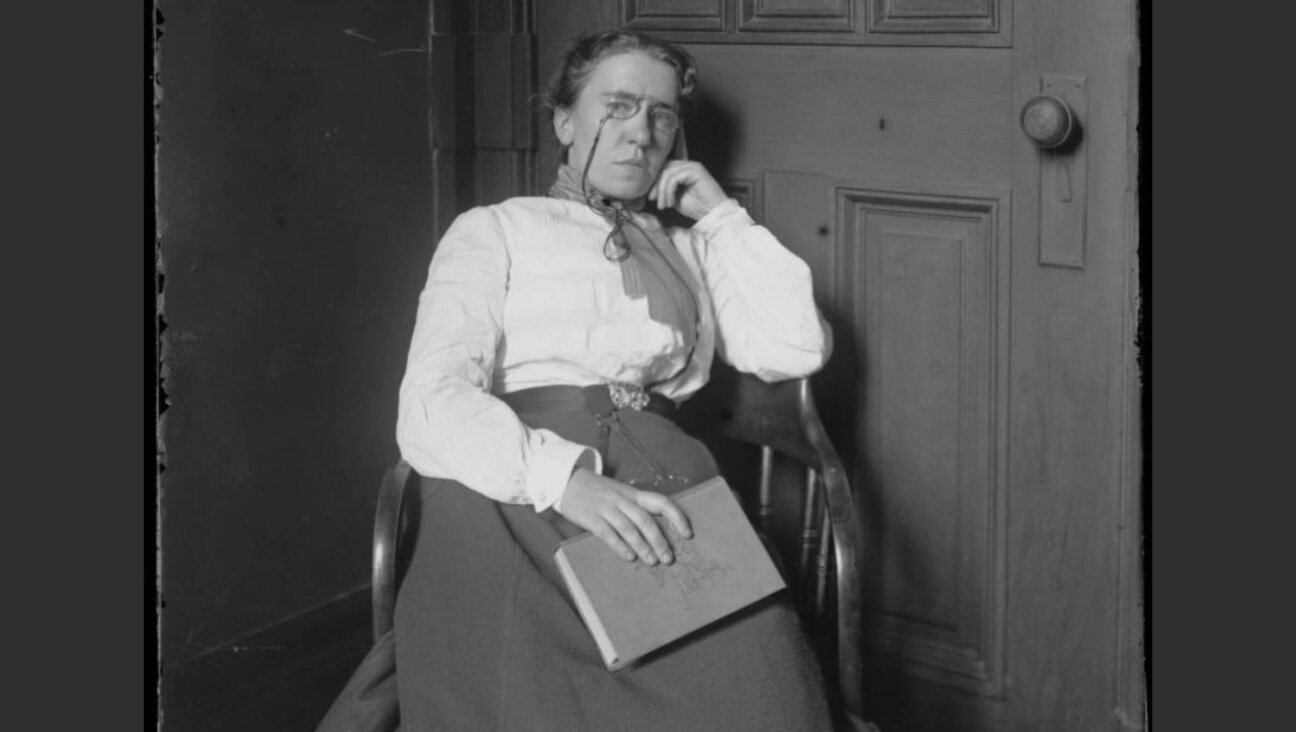‘Heil Hitler!’ He Yelled During ‘Fiddler.’ The Audience Feared For Their Lives.

‘Fiddler on the Roof’ at the 70th Annual Tony Awards on June 12, 2016. Image by Theo Wargo/Getty Images
Lyn Levine, 26, heard a commotion from the balcony. But it was only when she heard a man shout “Go home, Nazi” that she got a clue what was happening.
Someone had said something anti-Semitic, she realized. People were moving quickly out of the way. Faces showed surprise, confusion.
“The first thing that went through my mind was if this is a shooting, I’m sitting in the back of the theater,” she said. “This guy’s on the balcony, he wouldn’t be able to get to me just yet.”
In Baltimore, on November 14, it was intermission at the national tour of “Fiddler on the Roof.” Onstage, a boisterous Jewish wedding had just been broken up by a shocking pogrom. And the commotion Levine had heard was a man shouting “Heil Hitler, Heil Trump.”
Security escorted the man, who as of Thursday remained unidentified, out of the theater. But Levine wasn’t the only one in the audience to think that his anti-Semitic cry had presaged something worse.
One man wrote on Facebook that the woman next to him called her son to say goodbye, in case the offender was waiting outside the theater. “Hopefully I make it home to see you again and not get shot in a firestorm of bullets,” she said. And Rich Scherr, who posted a video of the response to the man’s outcry, [told the Baltimore Sun “I’ll be honest, I was waiting to hear a gunshot.”
“With the recent events in Pittsburgh, my mom and I, we were in the audience talking about how anti-Semitism is way more present than we’ve really experienced,” Levine said. “The Pittsburgh incident was in our community, but it still was not our home. [This] was a shocking experience for me.”
Baltimore’s Hippodrome, where “Fiddler on the Roof” runs through November 18, noted in a statement that local police spoke with the offender once security had removed him from the theater. “Our venue has a proud tradition of providing shared experiences to people from all walks of life, right in the heart of this wonderfully diverse city, and we intend to continue that tradition in the spirit of bringing people together, not dividing them,” they wrote.
The Baltimore Sun reported that the man was not arrested.
The journalist Alisa Solomon, author of “Wonder of Wonders: A Cultural History of ‘Fiddler on the Roof,’” said that as far as she knows, this is the first anti-Semitic incident to ever mark a production of the 1964 musical.
“Typically it’s been the opposite,” she said. “People have turned to ‘Fiddler’ as a way of intervening against anti-Semitism.”
But the fear of those in the audience who thought that the man’s anti-Semitic words were just the beginning was justified, she said, referencing the recent murder of 11 Jews at Pittsburgh’s Tree of Life synagogue. “I don’t want to jump to conclusions about who this guy is or what he was doing,” Solomon said, “but just on the face of it I’d say it’s fair to consider it another alarming instance of the license that bigotry seems to have under the current administration.”
Solomon noted that the touring production of “Fiddler of the Roof,” which debuted on Broadway in 2015 directed by Bartlett Sher, includes a particularly jarring staging of the pogrom that closes the first act. That attack is overseen by a constable who knows Anatevka’s Jewish community well. “He comes in and stands very quietly for a while, and is observing this wedding,” Solomon said. “It’s extremely menacing. More menacing than running on stage and screaming.”
It was good, she said wryly, that the man at the Baltimore performance didn’t stay until the musical’s end. After all, “the show sort of celebrates, by implication, the nature of the United States as a welcoming country of immigrants.”
The Wednesday performance marked the first time that Levine had ever seen “Fiddler on the Roof.” Her review? It was great.
Her mother was shaken by the incident, she said, but it didn’t sink in for her until later. “I’ve been feeling really overwhelmed and confused,” she said. “Today I’ve been really confused about what do I do now, how do I take how I’m feeling and turn it into action?”
Her cousins advised her to file a report with the American Civil Liberties Union, which she did. (“I’d never heard of the ACLU before,” she said.) But it didn’t feel like enough.
Why the need to respond through action? She was briefly quiet.
“I don’t think it’s appropriate for me to just be complaining, ‘Oh, this bad thing happened to me,’ and then not doing anything. A spark has been lit,” she said. “This thing happened to me. I don’t feel comfortable complaining until I can find or work on a solution.”
“But I don’t even know what that solution would be.”

















